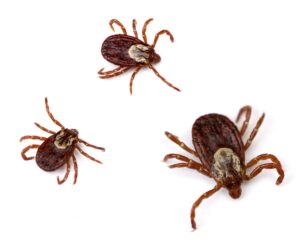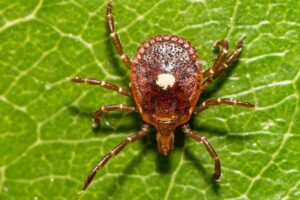How Long Can Ticks Live Without a Host?
Ticks are small, blood-sucking arachnids found all over the world. Understanding the life span of ticks, their host-seeking behaviors, and their ability to survive without a host can help in utilizing effective control strategies.
In this article, we explore the types of ticks found in North America, their typical life spans, how long they remain on a host, and how long ticks can live without a host.
Types of Ticks in North America and Their Typical Life Spans
North America is home to several tick species, each having its own unique life cycle and lifespan. Let’s look at some of the most common ones:
 American Dog Tick (Dermacentor variabilis)
American Dog Tick (Dermacentor variabilis)
The American dog tick, which is widespread across the United States, is primarily known for transmitting Rocky Mountain spotted fever and tularemia. The life span of an American dog tick can be up to two years, given the right conditions.
 Black-legged Tick (Ixodes scapularis)
Black-legged Tick (Ixodes scapularis)
Also known as the deer tick, the black-legged tick is the primary vector of Lyme disease. The life cycle of the black-legged tick typically lasts two years, depending on environmental conditions and the availability of hosts.
 Lone Star Tick (Amblyomma americanum)
Lone Star Tick (Amblyomma americanum)
The lone star tick, found predominantly in the southeastern and eastern United States, can transmit diseases like ehrlichiosis and tularemia. The lone star tick’s life cycle typically lasts about two years.
Other ticks you may encounter in North America include Gulf Coast Tick, Rocky Mountain Wood Tick, Western-Blacklegged Tick, Brown Dog Tick, and Pacific Coast Tick.
How Long Can Ticks Live Without a Host?
Ticks can survive for quite a long time without a host. This survival ability depends on many factors, including the tick’s species, life stage, and the environment. Generally, most tick species can live without a host for 6 months to a year.
It truly depends on conditions, most ticks die before reaching 1 year old. But that’s simply due to a lack of food sources or harsh conditions. There are instances where ticks can live for multiple years without a blood meal.
For example, under favorable conditions, American Dog Ticks can survive without a host for up to two years. Black-legged ticks can also endure for several months to a year without a host.
How Long Do Ticks Remain on a Host?
Ticks are hematophages, meaning they must feed on blood to survive and reproduce. How long a tick will remain on a host largely depends on the tick’s life stage and species. But in general, ticks will remain on a host for between 3 – 15 days.
Ticks go through four life stages: egg, larva, nymph, and adult. Larvae, nymphs, and adults require a blood meal to move to the next stage. Most species of ticks feed once at each stage, then drop off the host to digest the meal and molt to the next stage. This feeding process can take anywhere from a few days to two weeks, depending on the tick species and life stage.
For instance, black-legged ticks are known for their long feedings. The larvae and nymphs can feed for three to five days, and adult females may feed for up to 10 days.
Especially during Winter months, Ticks will remain on a host for longer than in the warm months.
How Long Can Ticks Survive Indoors?
Certain species, like the brown dog tick (Rhipicephalus sanguineus), have adapted to indoor environments and can complete their entire lifecycle indoors. However, most other tick species, such as the American dog tick or the black-legged tick, are not well-adapted to indoor life.
While ticks can be brought indoors on pets or people, they don’t usually survive for more than a few days to a couple of weeks in this type of environment. Their survival time indoors without a host can be significantly shorter due to the lower humidity levels typically found inside homes.
Other Factors Influencing Tick Survival
Temperature and humidity greatly influence tick survival. Ticks prefer warm, moist environments, and their activity peaks during the spring and summer months.
So in dry or freezing conditions, ticks can go into a dormant state to increase their chances of survival. This adaptability further extends their potential lifespan without a host.
Moreover, ticks are quite resilient against starvation. They can reduce their metabolic rate, which helps them to conserve energy and endure extended periods without a host.
Conclusion
Ticks are hardy creatures that can survive for surprisingly long periods without a host. Understanding their lifespans, feeding habits, and survival tactics is crucial for effective tick control and disease prevention. These insights can help in developing strategies to reduce tick populations, such as habitat modification – thereby reducing the risk of tick-borne diseases.
See also: how to keep ticks off dogs when hiking


